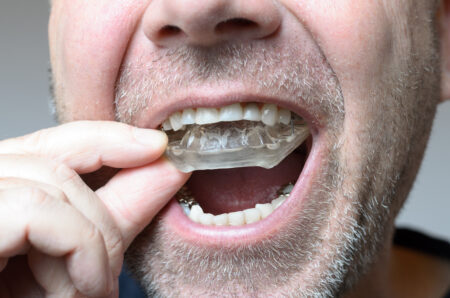 It goes without saying that from the moment you are born, your smile endures a consistent bombardment of oral bacteria and other threats. Indeed, while there may be a vast number of concerns to worry about, there is only one major form of protection that occurs naturally, and that is your layer of enamel. Because of this, it is imperative your practice an effective preventive routine. But what happens when nontraditional issues cause even bigger concerns? In today’s blog, your Overland Park, KS dentist discusses the implications of TMJ disorder, as well as ways you can care for your oral health and protect your smile from this phenomenon.
It goes without saying that from the moment you are born, your smile endures a consistent bombardment of oral bacteria and other threats. Indeed, while there may be a vast number of concerns to worry about, there is only one major form of protection that occurs naturally, and that is your layer of enamel. Because of this, it is imperative your practice an effective preventive routine. But what happens when nontraditional issues cause even bigger concerns? In today’s blog, your Overland Park, KS dentist discusses the implications of TMJ disorder, as well as ways you can care for your oral health and protect your smile from this phenomenon.
Dangers of Untreated Bruxism
Waking up every once in a while, with a sore jaw can be easily attributed to sleeping in the wrong position the night before, but enduring this phenomenon many times in a consistent manner is actually indicative of a much bigger problem known as bruxism. Indeed, bruxism is the name given to chronic teeth grinding and consists of tightly clenching the teeth together and moving the lower jaw from side to side.
Though it may not seem like a major concern at first, leaving bruxism untreated can cause a slew of complications. For example, the friction generated from clenching your structures together can actually lead to wearing down your protective layer of enamel. Once it is gone, it is gone for good. This causes an increased risk of developing infection.
Additionally, chronic bruxism can cause your teeth to weaken and become brittle. In other words, you experience an increase in developing major chips and cracks. To learn more about this process and what your options may be, give our team a call today.
How This Affects Your Health
Another major concern that develops as a result of bruxism includes a dangerous jaw dysfunction known as TMJ disorder. TMJ disorder occurs when the lower mandible becomes misaligned with one or both of the joints with which it hinges to the cranium. These joints – your temporomandibular joints (TMJs) – are critical to jaw function and operation.
Individuals who develop TMJ disorder may experience symptoms such as popping or clicking in the jaw, difficulty or pain when opening the mouth, and even significant tissue damage. Contact our team today to learn more.
What are Your Options?
Though bruxism and TMJ disorder are not favorable experiences for anyone, all hope is not lost. Indeed, our team offers treatment such as setting you up with an oral appliance or helping with splint therapy to help guide your jaw back into place safely.
Learn More Today
Contact Family First Dental in Overland Park, KS by calling 913-381-2600 to learn more about the ways we can treat TMJ disorder and bruxism, and schedule your next appointment with our team today.
